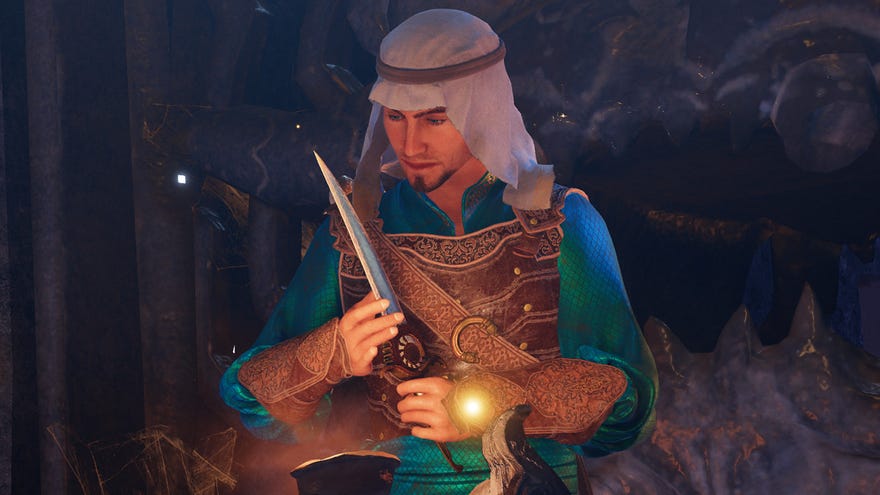Prince Of Persia's creator has seen the series "struggle to find its identity" at Ubisoft, but thinks they've finally found an elegant solution
Jordan Mechner on the sands of time, and making games based in history
In the mind of Jordan Mechner, the sands of time flow both ways. It happens even when he doesn’t mean it to. When making the Myst-like adventure game The Last Express, he set his story on a train crossing Europe in 1914 - the same year Mechner’s own grandfather became a teenage refugee, his life in a Jewish enclave on the Austro-Hungarian border shattered.
“He was drafted as a soldier,” Mechner says. “So I’m sure that in the back of my mind, in creating The Last Express, I was thinking of the terrible impact that war had on Europe and my grandfather’s experience as well. What’s interesting to me is that a lot of these echoes are unconscious.”
Mechner may not have been thinking of his grandfather when drafting the Agatha Christie-esque adventures of Robert Cath, an American doctor on the run from the police. But the personal resonance can hardly be called a coincidence. History-making and storytelling is a habit in the Mechner family. That same grandfather, Adolf Mechner, wrote a memoir that filled 1,000 pages and four loose-leaf binders in the 1970s. It became a kind of family heirloom - one Mechner initially ignored while he got to grips with the Apple II.
Shortly after the memoir was finished, however, when Jordan was the same age his grandfather had been at the outbreak of war, he started writing his own journals. Some of those have since been published, as accounts of the development of Karateka and the original Prince Of Persia. Now, Mechner has written a non-fiction graphic novel, Replay. In it, he expertly weaves his own story with that of his father and grandfather, hopping between timelines as if living in all of them at once.
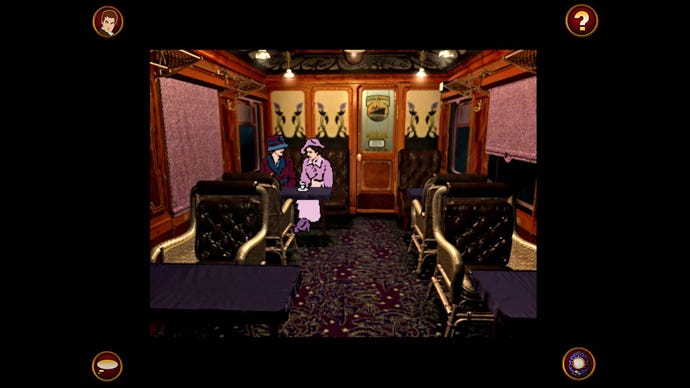
“I've always been fascinated by history,” he says. “All of my games, from Karateka to Prince Of Persia to The Last Express, have been set in historical time periods. I think there’s a lot to be learned from the past that can help us understand and appreciate the present and project into the future.”
Mechner is speaking from New York, where his father and brother and much of his wider family still live. In an odd way, I feel like I’ve come to know them. In The Making of Karateka - the part-game, part-interactive museum released by Digital Eclipse last year - Mechner sits at the piano with his dad to recount the earliest years of his career. “That’s a format that will adapt itself very well to telling the stories of the creation of other games,” Mechner says. “Prince Of Persia is of course a natural candidate. It’s been discussed, I hope it will happen.”
As it turns out, Mechner’s ambitions as a comic book writer pre-date his love affair with game design. But as a precocious teen, the arrival of the first generation of computers allowed him to get a headstart on a career in the creative arts. “Because the medium was so young, I could make a game on the same level as the professional games that were being sold in stores,” he says. “It was a chance for me to make something that could stand on its own and potentially be appreciated by a large audience. Without them just being like, ‘Oh, this was made by a kid.’”
Mechner’s first project with commercial potential was a version of Asteroids for home systems - right up until Atari began to clamp down on clones. But even in the age of the arcade, his storytelling instincts began to take hold. Mechner’s next game, Deathbounce, evolved from “just a triangular spaceship shooting in an abstract situation” to showing the pilot climb into the craft at the start of a level, telling an implicit tale of brave Earth defence.
It was only a matter of time before the storytelling took centre stage. Karateka, developed while Mechner was skipping his classes at Yale, followed a hero through a series of one-on-one martial arts fights as he ascended a fortress to save the princess Mariko. While crude by today’s standards, it’s sometimes considered the birthplace of cinematic gaming. Mechner had filmed his mother’s karate teacher with a Super 8 camera over summer break, then traced the footage frame-by-frame to create rotoscoped animation. The smooth character motion wowed players, and Mecher developed it further over the course of the ‘90s.
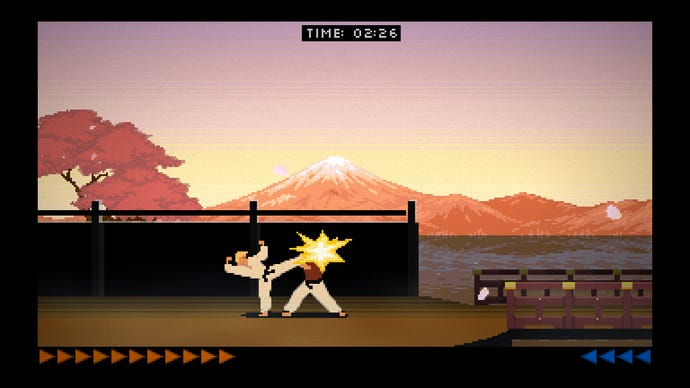
“I used rotoscoping in Karateka and Prince Of Persia, for action-arcade movements - fighting, running and jumping,” he says. “I had gone to film school and was always fascinated by cinematic language and the nuances of dialogue and directing actors. The Last Express was a way to bring those two things together, to make a game that also told a deeper and more multilayered story than I’d been able to.”
The development of The Last Express was, in part, a movie production - a 22-day shoot in which the actors who made up the main cast were photographed in makeup and costume against a bluescreen. The resulting frames were drained of their colour and then turned into drawings, coloured by hand. In the game, they’re artfully arranged to create the illusion of Austrian violinists and Russian counts moving between the carriages of the Orient Express, engaging in conversation and, occasionally, violence.
“The rotoscoping for The Last Express was really a way to capture the nuances of an actor’s performance, the body language and the facial expressions, and yet to do that in a way that was stylized,” Mechner says. “The visual inspiration was graphic novels and Art Nouveau. I didn’t want it to look like digitised video - I wanted it to look like an animated pen-and-ink drawing that had magically come to life.”
The Last Express took four years to make - a lifetime in ‘90s game development. On launch it won awards, but went unnoticed by the broader gaming audience. “There was a moment, because of the success of Myst, that we imagined that point-and-click adventure games would sell millions of copies, like arcade-action games,” Mechner says. “But that didn’t happen, Myst was the only one. When we were making The Last Express, the genre that was really exploding was real-time 3D multiplayer games, like Doom and Quake.”
Nonetheless, The Last Express remains an underappreciated masterpiece - its performances and tangible old world atmosphere still standing up. And ultimately, Mechner’s conviction that animated actors were the future of gaming was borne out. The gushing cover quote of Replay comes from Naughty Dog creative head Neil Druckmann, who in many ways has shaped the games industry in Mechner’s image. “Incredible evocative,” Druckmann writes of Replay. “A powerful emotional experience.”
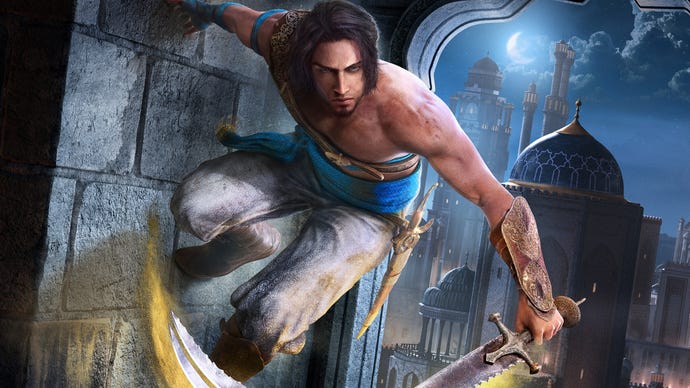
Like Druckmann, who co-created The Last of Us as a TV series for HBO, Mechner has a knack for adapting his own work. When Yves Guillemot called him in 2001 to propose that Ubisoft make a new Prince Of Persia, Mechner hit it off with the team. “I didn’t realise that I was going to end up moving to Montreal and writing the script and being so involved in that project,” he says. “It was really that I fell in love with it and wanted to do it.
“With a new generation of consoles, there was something about Prince Of Persia that almost magically fit the kind of game that we were wanting to make. That’s something that doesn’t happen so often in one’s career, so when we felt that excitement happening, I just went all in.” The game’s signature rewind mechanic is actually an echo of a similar tool in The Last Express. Time has a way of working itself into practically everything Mechner works on.
Later, Mechner took Prince Of Persia to Hollywood, pursuing his cinematic inclinations to their logical conclusion. He cut together a trailer out of PlayStation 2 footage and played it to Disney and Jerry Bruckheimer as part of his pitch for a movie. “I knew that I wouldn’t be taken seriously,” he says. “That in Hollywood at that time, the idea of a game creator wanting to write the screenplay for the film adaptation would be viewed with great suspicion. The story that I pitched and wrote had to stand on its own merits.”
Mechner proved persuasive. The Prince was played by Jake Gyllenhaal, opposite Gemma Arterton and Ben Kingsley, and the resulting movie was the highest-grossing Hollywood adaptation of a videogame until 2016’s Warcraft. As a student of film, Mechner went in with eyes wide open, and is philosophical about how much of his work made it to the screen. “I knew that Jerry Bruckheimer in particular likes to have multiple screenwriters work on a film, and of course that’s exactly what happened,” he says. “With Prince Of Persia, I was the first of five writers. But the draft was solid enough to get the film made.”
In the decades since, the Prince has mostly lain dormant, as a Sands of Time sequel morphed into Assassin’s Creed. “For a while there, Prince Of Persia at Ubisoft had to struggle to find its identity as clearly separate and distinct from Assassin’s Creed,” Mechner says. “You can see that in the 2008 reboot, and then several Prince Of Persia projects that were developed and cancelled, that didn't go the distance.”
Mechner himself moved to Montpellier in 2016 to work on one such project - greenlit with an eight-figure budget and an intended team of several hundred people. It’s a story told in the course of Replay with wry self-deprecation. In one scene, Mechner enthuses in his LA bathroom about the prospect of a sprawling, open-world Prince Of Persia. The interjections of his wife, Whitney, about the capacity of AAA development to destroy lives and families, go unanswered as Mechner enthuses about riding across Persia on horseback, camel or magic carpet.
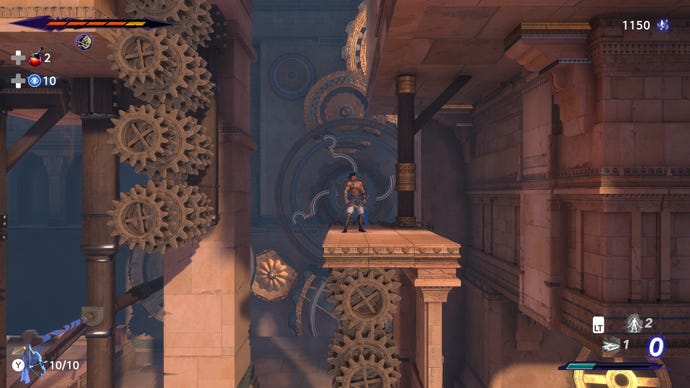
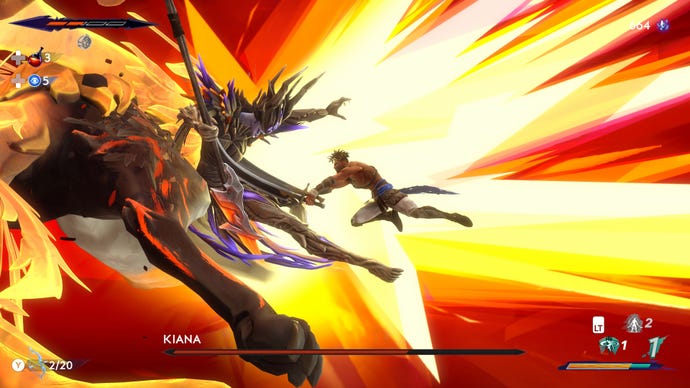
Over time, things slid sideways - Ubisoft deciding that the project should drop the Prince Of Persia setting in order to avoid a huge investment in an IP the publisher didn’t own. Today, Mechner still lives in Montpellier, but is dedicated to writing and drawing his graphic novels. Meanwhile, at long last, a new team in the same city has found a fitting shape for Prince Of Persia in 2024 with The Lost Crown.
“I’m very happy to see that they found a really elegant solution to that question of identity, by returning to the game’s 2D roots as a Metroidvania semi-open world,” Mechner says. “But also with beautifully stylised graphics, combat and animation that pays homage to the original Prince Of Persia and to The Sands Of Time - and fulfils gamers’ expectations while being very, very distinct.”
There’s a circular poeticism to the fact that Mechner, the New Yorker, has found a home in France - the same country his father fled through during the Second World War on the way to America. And that Prince Of Persia, which started in New York, has found its place in Montpellier too. None of this is lost on Mechner.
“We could say that these time echoes are accidental,” he says. “But it’s difficult to find which direction causality flows in. In the opening of The Sands Of Time, I have the Prince say that time doesn’t flow in just one direction. It’s like an ocean in a storm. And then in writing and drawing Replay, I found things that I couldn’t explain simply in terms of logical sequence. There’s a conversation between the past and present. I can’t explain it, but I can appreciate it.”
